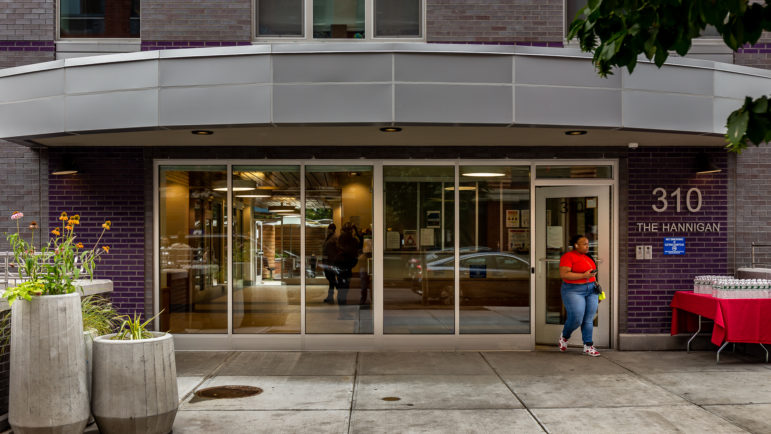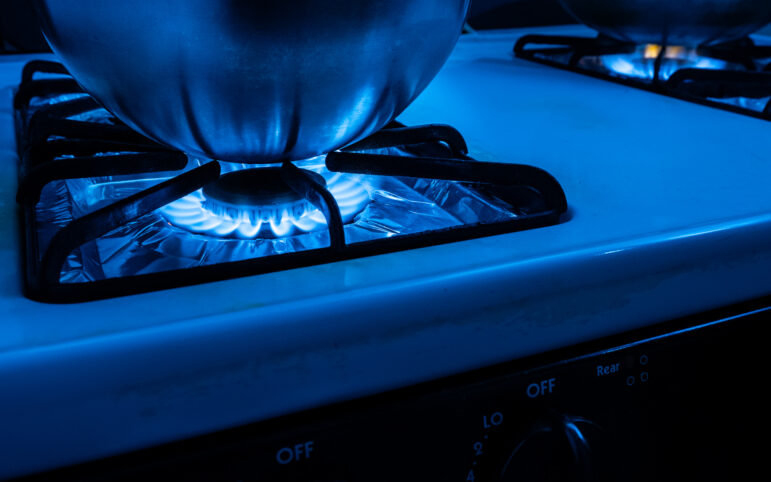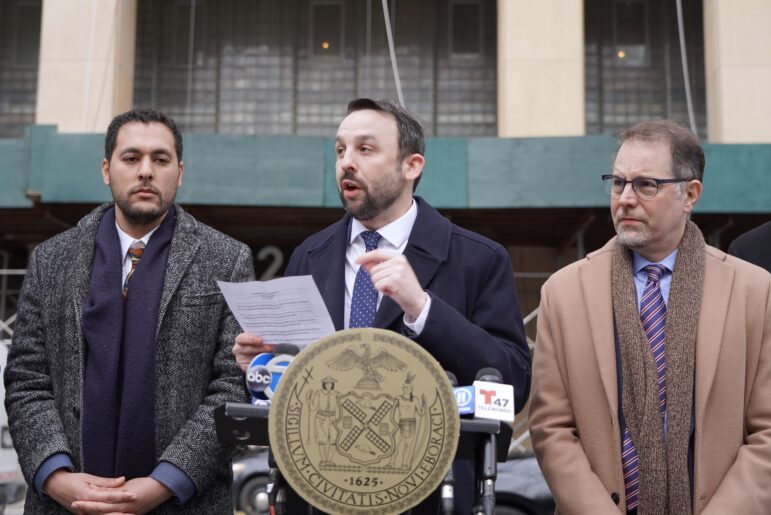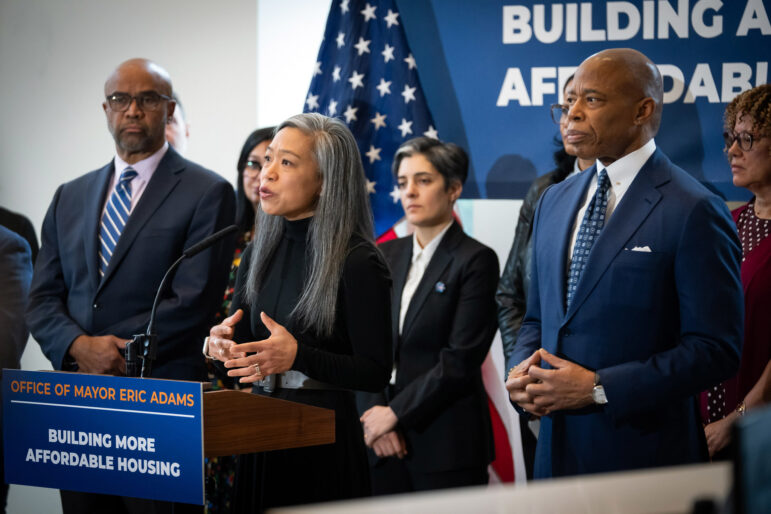
Photo by: C.S. Imming
A fan checks out the scoreboard at Fenway Park – site of the World Series game that will follow on the heels of tonight’s debate featuring Bill de Blasio’s Red Sox. The candidates will almost certainly make grinning reference to the game, though the joke will lose its edge faster than a hanging curveball if tried too often.
With the mayoral election mere days away, candidates Bill de Blasio and Joe Lhota will meet in the Saturday Night Live studios at 30 Rock on Wednesday, October 30th, in the third and final debate of the mayor’s race.
As the two candidates get together again, City Limits previews the issues likely to be raised by the panel of moderators – and some that will probably not be discussed, if past performance is any guide.
And because even die-hard policy wonks need debate sustenance and the occasional chuckle, we offer fun and fare for both sides of the debate, as well as a scorecard.
Section 1:
Law and Order: Special Soundbite Unit
Certain slam-dunk issues will be part of the conversation: NYPD leadership and the stop-and-frisk policy—declared unconstitutional in August—are sure bets.
The current mayor has filed a suit opposing the court-imposed remedies of stop-and-frisk; de Blasio has said he’ll pull the suit, but Lhota – a vocal supporter of Commissioner Ray Kelly – likely will not, given his statements that the practice is not unconstitutional at all.
They’ll also speculate (safely) about a potential new police commissioner – or the virtues of keeping Kelly on.
Give two points if either candidate surprises you on stop-and-frisk or the identity of the next commissioner.
Both candidates will praise the department and the officers on the beat; it’s the New York equivalent of kissing babies in the Iowa caucus race. (Deduct one point if either man fails to do so).
But will de Blasio be the first to raise the NYPD’s dubious Muslim surveillance practices? If he does, give him a point. Give Lhota a point if he makes de Blasio pay for raising it.
It’s likely the questioners, and thus the candidates, will avoid thornier turf: school safety, which stations 5,500 NYPD officers in the city’s 1800 public schools; juvenile justice reform and how to effectively monitor the police. It’s safe to bet that both candidates will avoid the nettlesome thickets of electronic surveillance – including hundreds of private and public surveillance cameras, red-light cameras and EZ-pass readers that can track drivers’ locations over time.
Give one point to the candidate that raises or even nods to these nuanced issues in response to general questioning. Give two more if they propose anything concrete to fund new reforms or sustain popular Bloomberg-era changes, like the Close To Home initiative that houses young offenders in New York City facilities, rather than the distant, upstate institutions where they were long consigned.
Possible points from the discussion about public safety: 15. Five bonus points to either candidate if he avoids slinging NYPD mud – whether it’s de Blasio invoking Lhota’s blundering “mall cops” comment or Lhota’s charging that de Blasio thinks NYPD cops are lazy.
Section 2
Take it to da house
Also likely to surface: Affordable housing or the absence thereof. The current mayor says the demand for housing is a good thing, inasmuch as it reflects the desire of more and more people to call New York City home.
Will de Blasio get to brass tacks on how he proposes to fund 200,000 new units of affordable housing? Will Lhota demonstrate any familiarity with the housing plan he endorsed? Give 10 points to the man who does a better sales job on housing.
Score two points if the homeless (more New Yorkers are homeless now, in 2013, than were without shelter when mayor Bloomberg took office) are mentioned by any candidate without being asked, three more points if they present a concrete proposal to address homelessness rather than just decrying the terrible contrast between the haves and the have-nots, and four additional points if they explain how they’ll pay for it.
Will NYCHA come up in the affordable-housing conversation? And if so, will Bloomberg’s proposal – to site private residential developments on NYCHA green space – be mentioned at all? Give 10 points to the candidate who treats NYCHA as seriously as a population of 400,000 deserves.
Possible points from discussion of housing: 29
Section 3
Teachers’ Pests
It’s elementary: no one can disagree that stronger schools mean that the next generation of New York’s working class – the same future taxpayers who will fund the next mayor’s programs – is better equipped to contribute and participate in civic life. Expect both candidates to utter versions of this truism. What will not be discussed, however, is mayoral control of the schools: Both candidates favor it. But here’s what else might come up:
Give four points to any candidate who mentions all four issues, and two additional points for each issue on which a candidate digs into substance.
De Blasio’s signature issue, universal, full-day pre-K (and afterschool programs for middle-schoolers) is now Lhota’s, too. Lhota guesstimates that full-day pre-K would cost $500 million—and says he can fund the new programs through budget savings, boasting that when he was budget director under Giuliani, he trimmed the city budget by more than the half-percent a year this effort would cost. DeBlasio’s proposed new tax – which will have to be approved in Albany, a slippery Everest of a challenge – will tap New Yorkers earning more than half a million at a level that elicits howls from Lhota, but actually is comparable to what the very well-off paid when Bloomberg’s first term began.
Give three points to the Republican if he convinces you that you can get the de Blasio program on the Lhota payment plan.
Maximum points from education: 15
Section 4
Immigrant Song
One area of (relatively recent) gentlemen’s agreement: City ID cards for undocumented New Yorkers, which should ease basics like opening a bank account and getting a lease. De Blasio’s support includes the goal of issuing drivers licenses as well – which Lhota has not (yet) mentioned, but who knows? His endorsement of municipal ID cards followed hard on the heels of a de Blasio press conference in mid-October.
An issue that should be a softball may instead throw a curve: Undocumented students who want to go to college – and how to fund their first, independent steps into the American dream.
De Blasio’s track record as Public Advocate includes the development, with the New York Immigration Coalition, of the DREAM fellowship – a program that gives $2,000 and a semester of mentoring and internships to a relative handful of students. (Ten scholarships were awarded in the program’s inaugural semester in 2012.) De Blasio wants to institute DREAM scholarships for undocumented high-school graduates – and aims to expand city and state law accordingly.
On immigration and other issues, Lhota has been trying to avoid de Blasio’s attempt to paint him as a Tea-Party Republican. Give Lhota 10 points if he manages to challenge de Blasio’s ownership of this issue, and give de Blasio 10 points if he keeps control.
Section 5
Working for a Living
One subject neither man will likely welcome – the forlorn elephant in the middle of the TV studio, poverty in New York. Amid our city’s great and spectacularly visible wealth, more than a third of city children go hungry every night; two-thirds of public-school students qualify for free- or reduced-price lunch. Universal pre-K is one long-term tool to address poverty, but it doesn’t do much for low-income people who are out of school. Will either candidate tackle poverty? Two points if either candidate brings the issue to the debate without prompting. Three if they do more than bemoan the situation.
New York may be leading the nation in new-job creation – but not all New Yorkers are working equally, according to federal data, and many of the new jobs paying lower wages than the jobs that the 2008 recession erased. More than a third of black New Yorkers are un- or under-employed, and spend more than a year, on average, looking for work until they find it. Tech jobs, tenderly incubated by the mayor, will help the city’s bottom line – but will likely do little to bolster or expand the middle class. Five points to any candidate who proposes a workable solution; two extra points if they resist the temptation of Bloomberg-bashing.
Will either have the cojones to talk about whether the city can afford raises for its unionized workforce, and if so, how negotiations might unfold, how high any raises might go, and how the city will pay for them? If either man can explain how he’ll raise revenue to meet the city’s obligations without increasing the tax burden, 10 points.
Total points on jobs and the economy: 20
Section 7
Alleluia, It’s Raining Mentors!
Also certain to come up:
If a candidate says anything interesting on bike lanes, soda, the unshaven lads from Fenway or former mayors, give them a point for each quip. Add another point if a candidate’s obligatory mention of Superstorm Sandy manages to be neither maudlin nor valedictory. Maximum points from this section: 5.
Conclusion
The final score
Add up their scoresheets and see if any candidate has gotten near the maximum 100 points. And tack up 100 bonus points next week if either of them can get out the vote next week: In the 2009 mayoral election, less than one in 25 New Yorkers under 30 went to the polls and voted. Unless something changes fast, in a city with 8 million opinions, the votes, and thus the voices, of a relative few will make the decision that defines New York’s immediate future.
The score campaign 2013 gets on voter engagement will be known in six days’ time.








